Elizabeth Gomez
“Another thing that makes me feel really powerful is the number of people who tell me...And I know this is going to sound so arrogant, but I mean honestly, I have really worked towards these goals, so it is about work, it's not about arrogance. When people say, ‘I didn't think I could do this, but because of you I was able to.’”
Admittedly, I was a little starstruck meeting Elizabeth. I knew that she was the founder of the Windy City Rollers, but after meeting her, I found out that she is also a writer, a stand-up comedian, a mother, and works for an alderman (one of my favorites). She is seemingly capable of doing anything she puts her mind to. A mutual friend, Anita Mechler, a former Windy City Roller, wrote a glowing recommendation for Elizabeth. I almost want to simply post what Anita wrote, but this compilation of excerpted quotes will give you a good idea: "chosen sister," "has positively changed the lives of HUNDREDS of women and some men in the city that billows out to the rest of the world," "fearless," "badass," "wicked laugh and sense of style," and "She is an extraordinary person who is fighting to be who she is everyday. She struggles like the rest of us, but she is extraordinary in that she always always strives to be more, to love herself more, to give to others more." Well said.
The portrait had to have something to do with gathering people, with human energy and plain old fun. Elizabeth wanted Chicago to be a part of the portrait, so I sought out a location with a view of the skyline. Then, we just needed to gather the rollers, which wasn't hard, except that we shot the video on Mother's Day. A few of the girls from the early days couldn't make it, but we were able to gather the following team members and we had Elizabeth's two daughters around to help: Coco Bang Bang/Sandra Skryzcki, Hausa Pain/Jen Payne, Carnage Wilson/Leslie Morris, Yvette Yourmaker/Michelle DeLeon, Anita Applebomb/Anita Mechler, and Sonya Mouthshut/Lauren Vilwock.
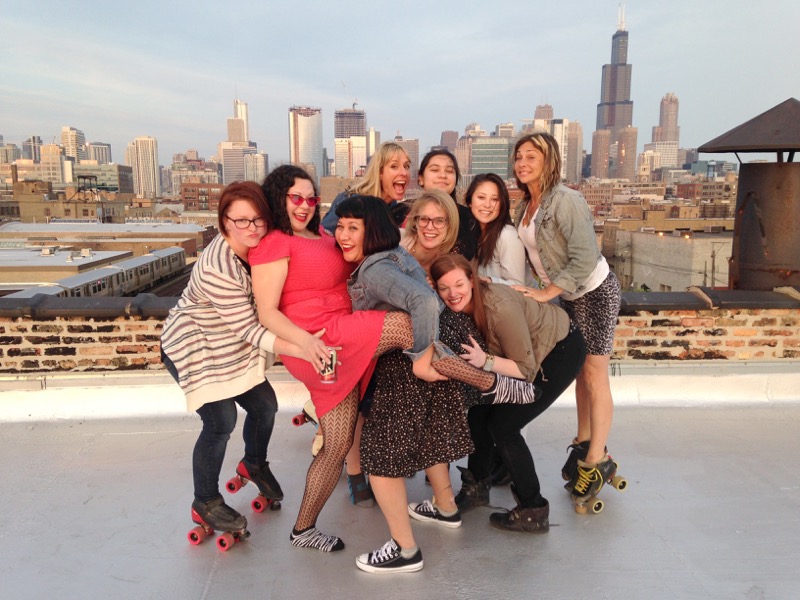
Lori: Who are you?
Elizabeth: Whoa. That's a heavy question. I don't know. I'm just a person in this big world; a small person. Yeah, I don't know how to answer that question. I think it's a difficult one. I think you're always changing and evolving, so who you are today isn't who you are tomorrow. I feel like such a Zen Master.
You do have a backlight, and you are partially glowing right now.
I couldn't answer that question. I don't ever know who I am and I think it changes. Like, if you asked me this morning, I would say I'm a miserable fuck. This afternoon, I'm productive and moving around. So, I don't have any answer for that one, I'm sorry.
Well, one thing that's interesting to me, when I ask that question for this project, is that no one has simply defined themselves by their job. Which is something that some people tend to do, or we tend to do that to other people. Like, oh he's a doctor, she's a waitress. When the subjects for this project have mentioned their paying job as part of their answer, they list about 40 other things as well. But many people have tended to be more existential like you just did, asking "Who is anybody?" It's been interesting to ask that question over and over and see how people read into it.
I think maybe that job thing is tied into to your education and your profession. I'm a desk jockey for an alderman. It's not glamorous in any way. It's not something I was seeking out. I didn't go to college and go, "I'm going to be a desk jockey for an alderman!" Whereas, Anita actually always talks about being a librarian. She defines herself by that. I think that has to do with the pride she takes in all the work she had to do in order to get there. She wants people to know that she's impassioned and empowered in that area; that she's put a lot of work to get there. That may be the difference.
How did you find your way to working at an alderman's office?
I harassed the guy. I've never been somebody who has had a clear path about what I want to do in life. I wanted to enjoy life, which is kind of a weird thing to say because I didn't know what that even looked like. I was working for a woman who was completely insane, but I really actually liked her a lot, but she was nuts. I mean, like, Devil Wears Prada kind of crazy. She was also great. She taught me a lot about what I can deal with, ways to say no, or how to stand up for myself. The best lesson she gave me was that, even in a professional environment, I can be who I am and people can love it or hate it, but that's what it was.
At the time, I was burned out from working for her. I was at a bar where the Alderman was having a party for Streets and Sanitation. I thought he was the bartender and I started giving him shit because he didn't know how to make a Manhattan, which is a key thing to know when you're a bartender. He told me he was an alderman, and I said, “There's no way you're an Alderman because you're not old, bald, and fat!” When I realized that he was not joking, I started to ask him about when he got elected and what he was doing there. He was so new, at the time he was only a few months into the position. He was extremely smart and very personable. He had a clear vision of what he wanted to see in Chicago and I was really moved by that. I sent him my resume the next day. I told him to hire me and he told me he didn’t have any open positions. So, I just kept, every week, calling him, and following up and trying to get into that office. Coincidentally, a couple of weeks after I'd met him, he had someone leaving.
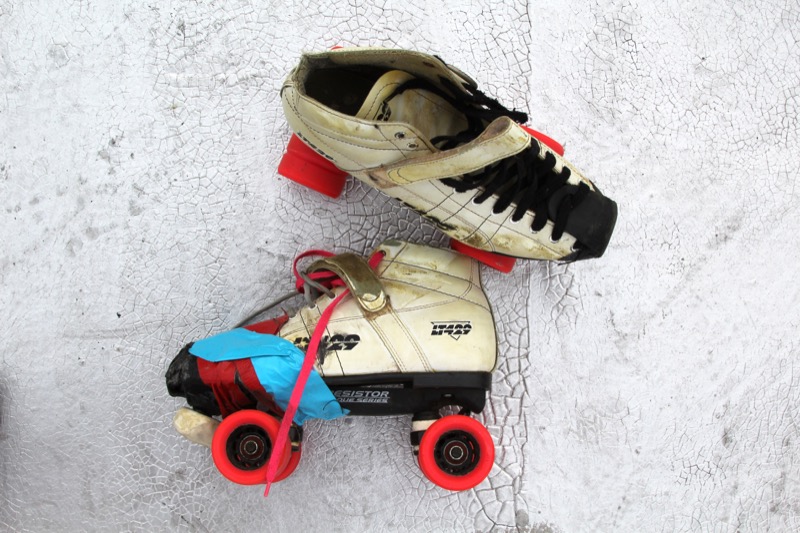
I kept pressuring him and pressuring him, eventually, I had some interviews, and I got the position. It's persistence and a little bit of luck, which is, what they say, leads you to all your paths.
It's like you purely changed your path because you were inspired by him and his idea. He must have seen that you were specifically interested in working with him and what he was doing.
I feel that way today. I make this really funny joke, well, I guess, it's funny to me. I keep telling people that it would be my luck that I would work for Scott rather than anyone else because I'll never get that free bonus car. All of the other crazy, corrupt Aldermen, historically, have given such weird gifts to people. Sometimes people are afraid of him because he’s like the Boy Scout of City Council. I don't know if I'd go for that far, but I do think that he is very focused on trying to make change in the government. He's always hitting his head against a brick wall. He keeps going because he still thinks that there can be some change and I can't turn my back from somebody like that.
Well enough about Scott. [laughter] How and why did you move to Chicago and how did stuff get started up for you here?
I was in LA prior to Chicago having a super, super fun time, like dangerously fun. I think that was probably residual from this extremely abusive relationship that I had been in before, and so, I decided to come to Chicago because I didn't want to go back home to where my mother was, which is in Virginia. I didn't know anyone in Chicago, but I had worked with somebody in Burbank, California for a little bit who was living here. I spent my first night with him. The next morning, I found an apartment in Chicago. I found some little odds and ends jobs, because back then, telemarketing was really big. You could pick up a telemarketing job almost in any city, at any time, and you'd make a pretty decent living. This is 20 years ago, almost.
You would make 11 or 12 dollars an hour selling credit cards for Sears, or aluminum siding, and stuff like that, plus bonuses. I started picking up a job there and then a job here, eventually I ended up at the Museum of Contemporary Art, in their gift store. Then I ended up working at a print shop where I met my friend Kelly, who became Sister Sledgehammer eventually. We are good friends, though we started off rough because she couldn't stand me, I guess. I was like this punky kid from LA with crazy colored hair and all these body piercings. I had this very liberal point of view in life. She was a Republican from Michigan, straight up hardcore Republican. We eventually became friends, I think because we were both reading a couple of John Irving books, and he was in town to talk. I wanted to go see him and she wanted to go see him, so she offered me a ride and like anything else, when you spend time with somebody and actually talk to them, you learn a lot, right? You learn a lot about what you have in common. That launched us into our friendship.
What gave you the idea to start the Windy City Rollers?
I had never, ever owned a pair of tennis shoes, or bicycle, I was never athletic at all. At that point, I was going through a divorce. It was pretty rough, and I think any moment where I could just not be around my ex-husband was always ideal.
How old were your daughters at the time?
When it started, they were probably around two and five. I started riding my bike to and from work because that gave me some exercise and some time to clear my head. Then Kelly, that year, had encouraged me to run when it was wintertime. I started running and she and I started doing all these weird athletic events, like an urban race where you had to do trivia. The one I hated most was, I entered a 5k and I thought I was so amazing for doing that, but then she asked me to do a 10-mile, and I guess I didn't realize...I mean, there's a big difference. Never again.
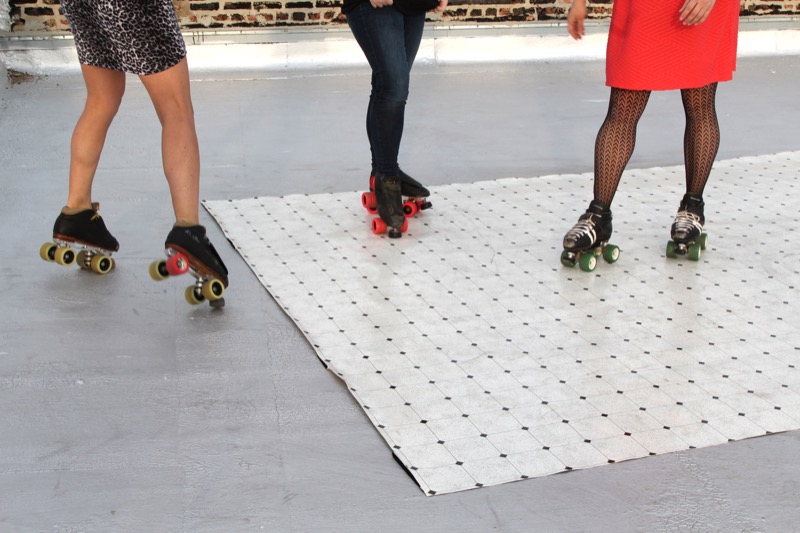
We ended up in Austin, Texas and went to a place called the Continental Club where we met this waitress. I think my memory is revisionist, but I imagine her with a denim skirt, gingham shirt tied up, and a cowgirl hat. Kelly looks at her and said, "What is that tattoo on your hip?" The girl just turns around and she's says, "It's not a tattoo. It's a derby burn." I was like, "What?!" She quickly turned around and walks away from us. I melted. I thought, “You are a bitch and I love it! I want to be that. How do you become that?” She was confident and assertive and I liked it.
When we got back to Chicago, I started looking up roller derby leagues in Chicago. I couldn't find any, but I did find some in other places: Austin, New York, North Carolina. I asked if they knew of anyone in Chicago and they didn't. But they kept saying, "Well you could always just start your own." I thought that was crazy because I hadn’t skated in a long time.
Was there one in LA at the time, too?
Yeah. It was LA, Texas, North Carolina, New York, and Madison was starting two months before us. I’m not sure about Las Vegas.
They're all pretty far apart too. They can't benefit from each other, communally. I mean, you could travel to compete but they're so far away that it's not like...
Right, and when you say “travel to compete,” with what money?
That's true too. That's not even happening yet. It's all local at the time.
It happens now, not then. It would cost so much to get there. If you have a team of 15 girls and you take 10. Plane tickets for 10 girls alone, that's going to wipe you out. Anyway, they kept saying, like, "You should just do it, you should just do it." Then I thought I guess I can and then I did. That's pretty much how it happened.
How did you find the women at first?
That was really probably the most fun I had through the whole process, meeting all those women. Because now, I feel like I know over a thousand women in Chicago that are somehow related to me in derby. Either I've trained them, I've been at their tryouts, I've been on their teams, I meet them on the street. It's a great, great connection, but I didn't have any friends before then. It was me and Kelly. Me and Kelly and my babies, that's all I had. Kelly and I loved to go to bars, hang out at the old man bars. We loved being on our bikes. We worked at a print shop, fortunately, and printed up probably somewhere around 5,000 flyers and literally got on our bikes and spent days and days drinking, biking, and passing out flyers. Anytime we saw a woman who seemed like they were carrying themselves a certain way, or they were nice or they'd smile at us, we would pass them this flyer and tell them to come skate with us. People started calling.
What year was this?
The summer of 2004. We had our first recruitment at a place called Trader Todd's. It was me and Kelly and two girls we had picked up along this whole process, who ended up fading out right then and there. That was the last time they were interested. Nobody showed up for that one, so we had an official party on September 16th of 2004, where around 125 gals showed up. Some of the Madison girls came and celebrated with us.
And so, this leads what we chose to do for your portrait. We were kind of riffing on ideas of how we could show who you are and what you've done and what makes you happy. You had sent me a photograph of the team from 2005 in Springfield.
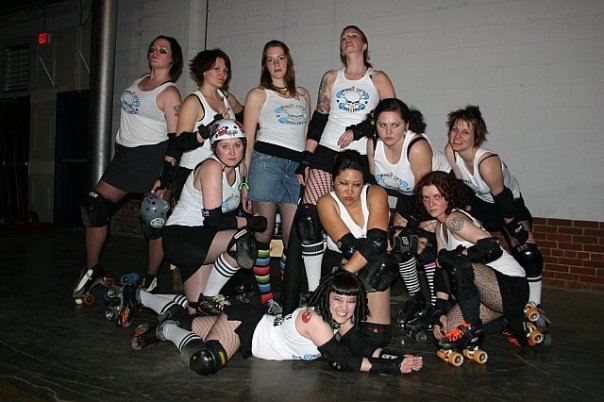
That was one of our first exhibits. I think that, specifically those women to me, have changed... oh, I'm getting so emotional. I loved being with them on that roof! Those girls have been my friends for a long time, you know. They have seen me through some shit. I think I was one of those girls who always felt like I couldn't be friends with women. I always felt like that I connected more with men, that I was more like men. 2004 doesn't seem like that long ago, but it has been a long time. Our society has changed, hopefully, and access to people with the same opinions is a lot easier. But back in 2004, it wasn't like everyone had a cellphone.
I don't feel like I was able to find my tribe for the longest time until I started the roller derby. Those particular girls in the video are girls that I hang out with today. I can call them. I don't have to talk to them for months, and I can call them and they will, drop everything to do whatever with me and it's an amazing relationship to have with someone. They were super inspiring because when I started it we would interview girls and ask, "Why are you interested in skating? Can you give up this time?" The common response would be, "Well, my biggest concern about joining this all-female roller derby league is women. We're afraid it's going to turn catty, jealous, or angry." That statement was still so attached to so many of us. Especially ones, like women who are rebels and loners, and I-don't-give-a-fuck kind of girls, because we had made our own path despite a lot of the sexist stuff that you deal with.
What happened with us was that we made each other, as a whole, stronger. We helped each other get more focused and determined. We helped each other clear our heads and get goals, and figure out ways to make plans to basically take over the world. It was an incredible change and shift to my person and then having two daughters that were so young at the time, that made my world so much brighter for them. My mother, who is Korean, when I had my second daughter, was like, "Well you know, you could still try for a boy." My mom's crazy. She's lovely, but that's just her mentality. It's just this kind of old school Asian thinking. So to find this tribe of women, who are like, "No, fuck that, we don't need boys. We're better than that, we deserve better than that, and we're going to work toward all of our dreams" was amazing and so many have. I mean, they've all changed during this time. We've all broken up with people, we've all gotten back together, we've all switched jobs, we've had babies, started businesses, gone to school, moved, but at the end of the day, I can call anyone who was a Windy City Roller and they would still stand for me. That's an incredible gift... It just doesn't stop giving.
Witnessing it was crazy to me. Normally, when I'm the director, people are really quiet and they're waiting for me to do something and I'm talking a lot. I felt like I was just observing and in awe of the energy of this group. And I don't mean I thought you guys were talking too much, not at all. It was great. Like when Coco said "I don't want to get in your way, but I have a little idea." And I was like, please, this is great! Everybody was enjoying it, active. Everyone was giving and receiving throughout the whole thing, which is so rare. You have to be in the right mindset to be like that. And it was nice to see how this idea of summoning them and bringing them back together for this portrait ended up working out because it was just so fun to see how they each entered the frame differently. How their personalities stood out.
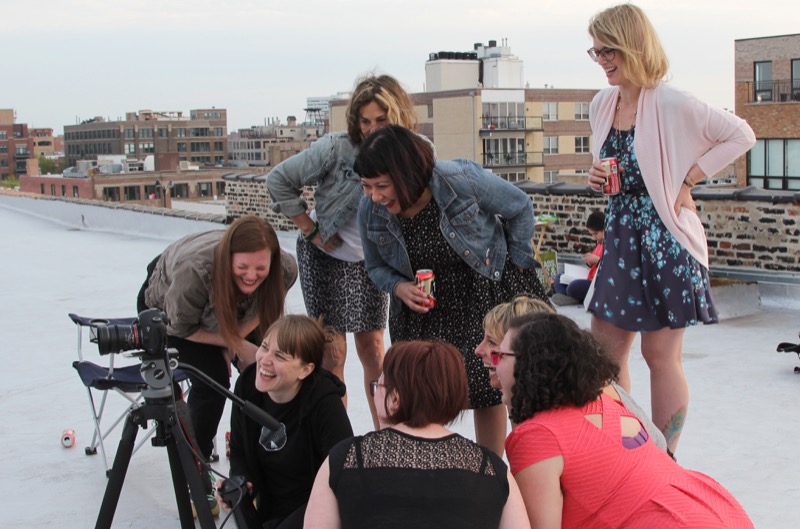
What was your title? Founder? Director? Or what did you call yourself actively?
We didn't really have titles like that. Every year would shift depending on what we needed. I was recruitment, I was training, I was marketing, I was helping break up into the committees, we were dealing with the financials. Anything you need to run a small business, I was at least in one position at some point or another. It was tough. The first two years were extremely emotional and difficult. Not having very much to look back upon, not having much of a structure to look up to. We had to kind of create everything ourselves. We made a lot of mistakes and we did a lot of things that didn't work out well for us, but at the same time we managed to survive and I feel like, that's the true story for almost any woman you ever meet, right? You're always just trying to figure it out. You're going to make some mistakes and hopefully you'll get to a point where it feels good. We were able to do that.
And some of those struggles proved to be bonding moments in it themselves. You had a day job at that time, right?
Yeah, I had a full time job and I was dealing with my girls, and I was dealing with my divorce and I was looking for a place to live, and...
How many hours a week on average was being a Windy City Roller?
For me it it felt like 40, sometimes even more.
I don't think there are that many hours in a week. I'm not sure if that's possible.
I feel like it was constantly having my daughter on my lap while I was answering 25 million emails. Everyone's idea you had to negotiate, everybody wanted your time, everybody wanted to talk to you because you were the person who started it. Eventually, I think all the women started to feel very empowered in their own right. That was amazing to watch. They would take control over things and it was wonderful. The longer I was there, the less time it would take. Even at the minimum, if you're just a team player, you are investing anywhere between six to eight hours a week in training, just on skates. Then you have to get there, and then you have to leave, and then you're part of a committee, and then you have to promote. I think that probably the average skater, I would assume is doing anything between 12-14 hours, on top of their regular jobs, and that's a lot.
But what was it like when you had to stop? Or when you've decided to stop and pull away?
It was good because it was time. I had been there longer than I should've and I was miserable for the last two seasons, for sure. I didn't like doing it anymore. I was really tired of listening to people tell me the same things that I had heard all the time. There's a handful of skaters that had also stayed there the whole time that I was there, and actually two of them who just retired after ten full skating years. I'd been there for so long, that people would be like, "Elizabeth, I have such a great idea." I'd ask what is it? "You should market with t-shirts." I’d roll my eyes. Because with every new person, you have this new enthusiasm and they don't necessarily know the history of the league and what's going on. They're still kind of trying to really make their mark in the group. It was constantly listening to people just try to reinvent the ideas, and you're just like, we've done that, we've done that.
And you need to let them do that, and not stop them by saying "I'm tired of t-shirts". Because they do need t-shirts, because new audiences, new chests, that need to be covered.
New designs! Anybody who's in a good management or leadership position wants to be able to empower people and try to guide them from not wasting too much time doing things that, you know, have historically failed. Sometimes, and this is also true in life. You try something one year and four years later you try it again, and it works completely differently. Right time, right person, right place, you never know.
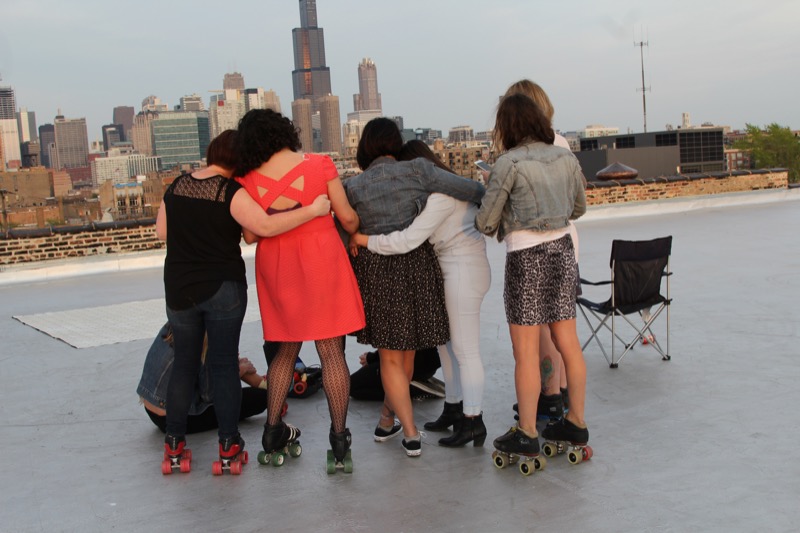
And so then, you pulled yourself away from that, focused on Elizabeth for a little while, and you...
I got married.
...And you started doing a couple of new things too...
For the first couple of years I think I was drunk every night, I swear. I was celebrating all the time, revisiting all my friends, and trying to get travel plans together and do lots of wonderful, wonderful things that didn't involve roller derby. I ended up going on a month-long trip with Rotary International to Tokyo. I went on a two-week trip with World Chicago to Nepal and Bangladesh. I started Drinkers with Writing Problems, which is my writing group. Then I started doing stand-up and storytelling.
That's all so amazing.
What's crazy is that it's all happened since 2011. Everything has changed. Everything is just different, and crazy. I think I have this work ethic where I don't like to stand still too long. I'm always just hustling for the next thing and the next thing. Even wherever I am, I'm always like, oh it could be better, how do I get to that next spot? I think right now, my Drinkers With Writing Problems group are ready to kill me. They are probably thinking we're supposed to be writing in your kitchen, not doing live shows or publishing a book.
What's your writing like? What kind of writing do you do?
I'm a terrible writer. I'm not very creative or flowery with words, so I like to write a lot of autobiographical things. Stories about my mom, who is an interesting and important figure in my life. The way I see motherhood is kind of a weird thing. I think it's a very boring topic, but at the same time it's what I know, right? I definitely like to put a lot of humor into things, because I think life is ridiculous. I'm playing this year with a little bit of fiction, which is harder for me to deal. Someone was telling me the other day, "You know you're writing fiction all the time, like when you're talking to somebody and you need to confront them. You always have to predict what they are going to say, or what their emotions are about." But, I don't get that at all because apparently I'm too self-absorbed. I don't care what you think. This is my problem.
Does your stand-up relate to that too? That you're more of a personal storyteller with the comedic side, is that how you do your stand-up? The storytelling type?
Yeah, for sure. One of the reasons I don't do so great in the world of stand-up is because I tend to be long in my jokes. I'm not good at one-liners. I'm just not that clever, I don't think. I want to make a point, not just, “Take my wife please!”
You can be funny along the way, but you're not necessarily delivering satisfaction every line. To me it's all about keeping attention, and that can be a long story where I don't laugh at all for a while, but if it's interesting, that's great.
I had a teacher once tell me that long stories don't matter as long as the payoff is worth it, but the payoff has to be worth it. Otherwise people don’t want to see you again.
What makes you feel the most powerful?
That's tough because I feel like there are different types of power. I feel really powerful recently because I started to go back to the gym to do weightlifting. That's kind of a cool thing. That makes me feel super powerful. I can go through a two-hour workout and squat and lift weights. I also feel super powerful when I can give advice to my daughters that they can understand and that they don't necessarily agree with, but allows us to have this dialogue between each other. It's not this "I'm not listening to you, mom. You're stupid." It's more like, "Okay, I get what you're saying, but here's my point of view." Being able to have that conversation together makes me feel crazy powerful, because I don't know if people have those relationships a lot with their moms. I did not. My mom was very much like, this is the way it is.
Another thing that makes me feel powerful is the number of people who tell me...And I know this is going to sound so arrogant, but I mean honestly, I have really worked towards these goals, so it is about work, it's not arrogance. When people say, "I didn't think I could do this, but because of you I was able to." That's an amazing feeling because a lot of times it just makes me want to crawl under the table and tell people to shut up. It’s taken me years to acknowledge that. I do purposefully work in my friendships, and I purposefully work in organizations, and I very purposefully try to push people. That's not an accident. That's not something that happens because of luck. That's something that I really conscientiously want to do. I feel like I can finally take credit for that.
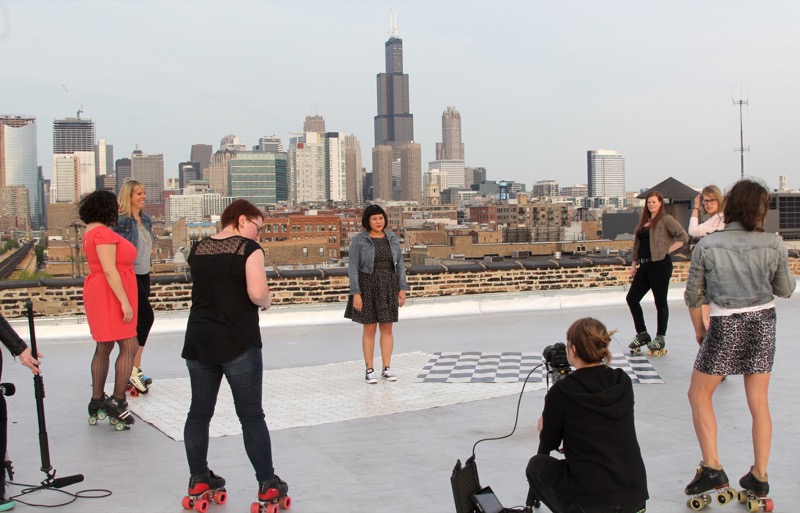
And it's okay to feel proud of it and to admit it. But there's a couple of stages in realizing that you've done some good: realizing it within yourself, acknowledging it, embracing it and then being able to say it out loud. It's hard to do, because I think that in general, as a society for sure, but certainly as women, it feels like we're not supposed to be bragging about stuff like that.
But you see, you chose the word "bragging", because that's what we've been told as little girls. Don't brag, people don't like braggers.
How about the opposite? What makes you feel powerless?
That's a feeling I don't get very often and I think when I do get it, it's probably when I think about the past. There are a lot of things that can't be resolved. I wish I wasn't damaged from those things, but I am. There's a little bit of power in recognizing this is why I'm this way and this is what it is. It's not the same thing as having full control over it. That's probably where I feel the most powerless, when I wish I wouldn't have made that choice or I wish I would've done that differently, and knowing that it can't be resolved ever.
But if those things hadn't happened then, you wouldn't have the power and the joy you have now, probably, because one thing gives you space to do another.
That's what they say. With some things I think I would still end up in the same spot.
Yeah, who knows. Fate is confusing, I don't know.
Like, I really didn't need those four Taco Bell bean burritos. That probably wouldn't have changed my fate that much.